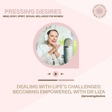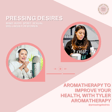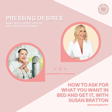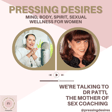
Episode 14 Addressing low libido and HSDD - When to see your GP and what to expect, with Dr Lisa
"Navigating Low Libido & HSDD: When to Seek Help and What to Expect"
Game Time: RED/AMBER/GREEN
In this episode, we start by playing the RED/AMBER/GREEN game with dressing up in the bedroom! I want you to think about how you feel when it comes to role play or costumes during intimacy:
- Red: "Nope, not for me."
- Amber: "I might be open to exploring this, but I’d like to learn more."
- Green: "Yes, I love this and regularly incorporate it into my sex life!"
Dressing up and adding a bit of novelty can be a great way to stave off sexual boredom and introduce new excitement into a relationship. Novelty helps keep things fresh and stimulating, but it’s important to note that it’s not a cure for deeper sexual desire issues like Hypoactive Sexual Desire Disorder (HSDD). So, while spicing things up with some role-play can be fun, stay tuned to learn more about HSDD and how it’s treated.
What We’re Covering in Today’s Episode:
- What is HSDD?
- We’ll break down the difference between low libido and HSDD, focusing on how HSDD is defined by the distress it causes over a persistent period of time.
- How is HSDD Assessed?
- We’ll dive into how GPs use the biopsychosocial model, which considers biological, psychological, and social factors when diagnosing HSDD.
- When to See Your GP
- Learn when it’s time to make an appointment with your GP, especially if your low libido has been troubling you for more than six months.
- What to Expect During Your GP Appointment
- From blood tests to hormone levels, find out how your GP will assess your condition and the role testosterone therapy might play, according to the NICE and British Menopause Society guidelines.
- Self-Help Tips
- We’ll explore ways you can empower yourself before your GP visit, including keeping a desire journal and tracking your symptoms.
- Empower Yourself During Your Appointment
- Learn how to advocate for yourself during your GP appointment, ask the right questions, and make sure your concerns are heard.
Key Takeaways from the Episode:
- Understanding HSDD: We cover the importance of differentiating between a temporary low libido and Hypoactive Sexual Desire Disorder, which affects between 6% and 19% of women globally.
- British Menopause Society Guidelines: For postmenopausal women, testosterone therapy can be an effective treatment for HSDD, but it needs to be carefully monitored.
- Practical Steps for Self-Care: While seeing a GP is important, we discuss lifestyle changes like managing stress, improving communication with your partner, and introducing novelty into your relationship to help keep desire alive.
- Feeling Empowered: We offer step-by-step advice on how to feel more in control of your health and sexual well-being before and during your GP appointment.
If you think you may be struggling with HSDD or would like to explore how coaching could help you reclaim your sexual desire, I’m offering free 20-minute consultations. You can book yours today by visiting the following link,
https://calendly.com/pressing-desires/freeconsult
I’d also love for you to follow and engage with me on Instagram at @pressingdesires. Stay connected, ask questions, and join a community of women taking charge of their sexual well-being!
And if you have any further questions, feel free to email me at info@pressing-desires.com











